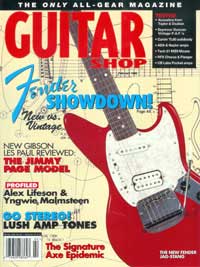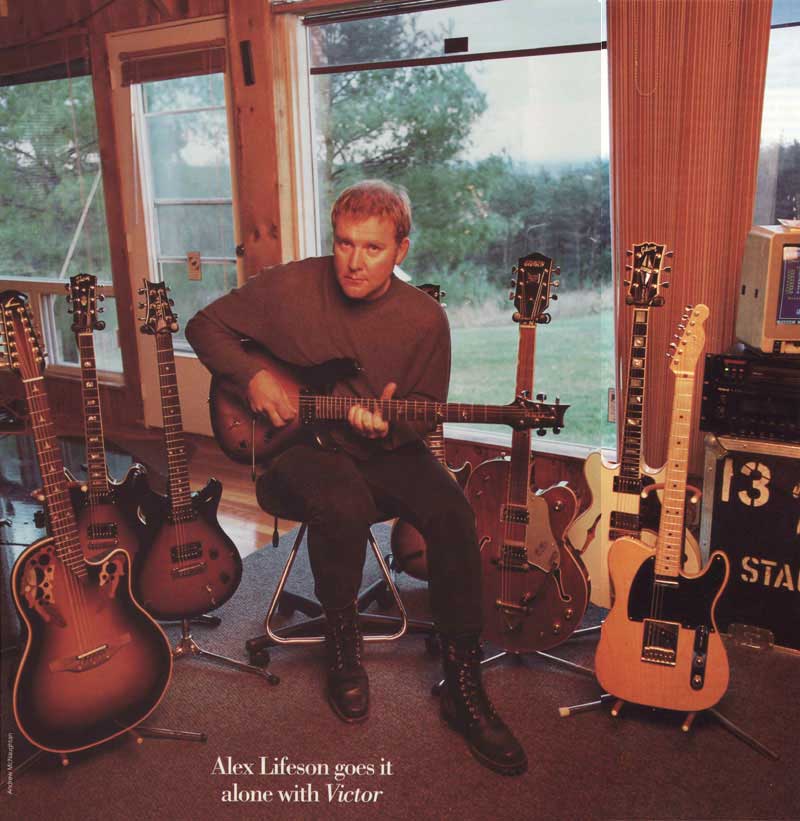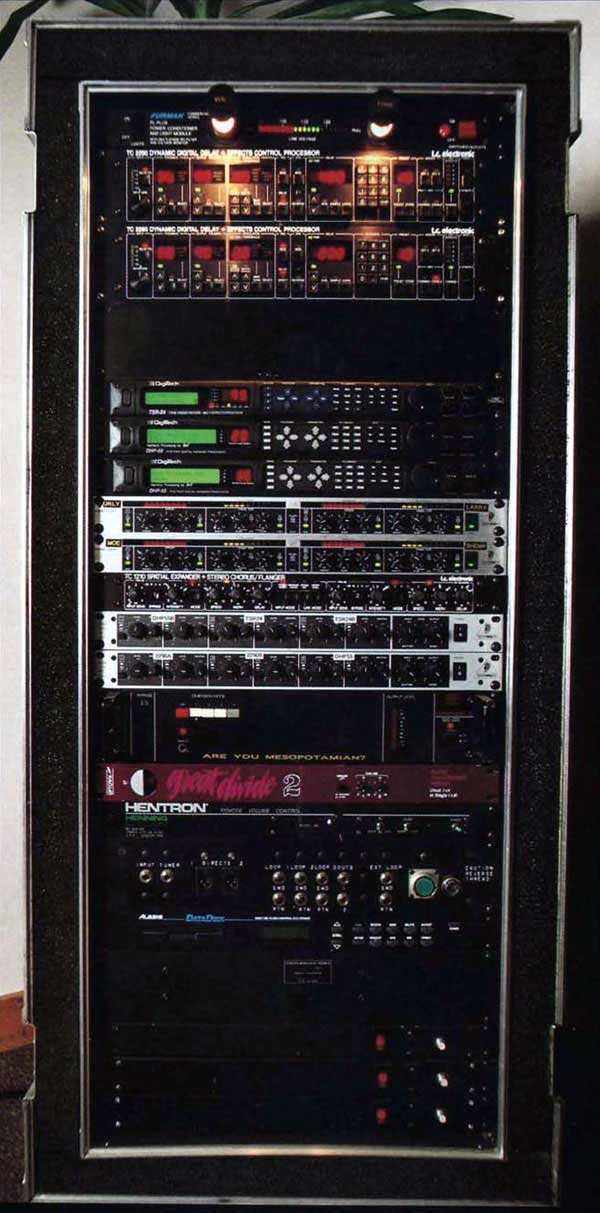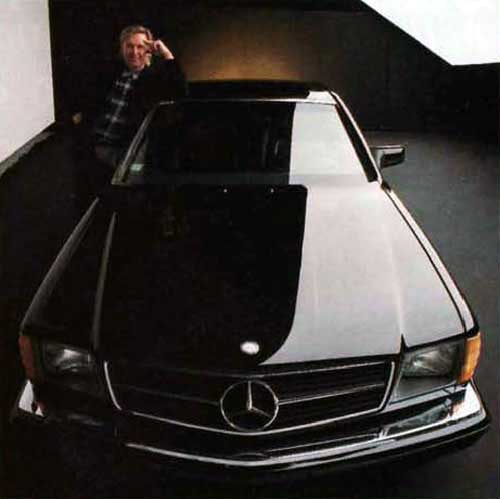Solo Signals
Alex Lifeson Goes It Alone With Victor
By Mike Mettler, Guitar Shop, February 1996, transcribed by pwrwindows

"Even if nobody ever hears this record, at least I know that I put everything into it." So says Alex Lifeson about Victor, his first full-blown solo project after 20 years as lead guitarist in Canada's finest power trio, Rush. Don't go jumping to any hasty conclusions, for Victor is not meant to be a statement of freedom - Rush has already entered the studio to lay down tracks for their 16th studio album, due sometime in late '96 - but rather a signal of strength. For the first time in his career, the 42-year-old Lifeson has taken total control of an album project and done everything by himself - he wrote all of the music and the lyrics, did all of the mixing and engineering, and even helped design the album's eye-catching artwork. Result: one triumphant, hard-as-nails record, served well-done.
"Victor was initially born out of boredom." Faced with a year and a half of downtime after Rush's Counterparts tour wound down in early '94, Lifeson holed up in the basement home studio he's dubbed Lerxst Studios (Lerxst being one of his more printable nicknames), and began to write music and eventually lyrics, something he readily admits he's not exactly been known for; his only previous lyric credit was "Making Memories," from 1975's Fly By Night [transcriber's note: Lifeson also penned "Lessons," from 1976's 2112]. "When I first started this project in late October of '94, I had no idea about how I was going to do it," Lifeson recalls. "I did know that I wanted to work on a project that was going to push me to the limit. But I didn't realize how much work I had to do to get there! There were so many things involved that I had never done before, since we all share the responsibilities in Rush."
For the most part, Lifeson toiled alone at Lerxst headquarters, "using a footswitch to activate the record button," though he did recruit fellow Canadian Bill Bell (who regularly plays with rocker Tom Cochrane) to come in and lay down some additional guitar tracks. "It was quite different working with another guitar player - and quite refreshing, in a lot of ways," Lifeson attests. "Bill had so much energy, and he was great to have around." Other players, like Primus bass-hound Les Claypool, I Mother Earth vocalist Edwin, and drummer Blake Manning show up on some of the finished tracks.

Nine years ago, when Lifeson first moved into his house just north of Toronto, he'd already mapped out his dream home studio. "At first, I planned to have a large control room and just a medium-sized studio," he recalls, "but that didn't quite work out. In fact, I had to eliminate the separate control room entirely. Now the control room is completely isolated with a floating floor and floating walls, and I have to say that it's a much more comfortable environment to work in. When I close it off, I can't hear anything from the outside, so I can monitor as loud as I want." Alex calls the actual recording room his "office - it's an 18x20 room with a 10-foot ceiling. It's not the ideal-sized or -shaped room, I know, but it works for me."
To get the feel he needed for Victor, Lifeson believed that miking the room properly was key. "I knew right away that I wanted to close-mic everything," he explains. "The room has a bit of a slap to it, so it definitely needed to be close-miked. I also put up some baffles and I built a vocal booth using blankets and extra pieces of carpeting. For vocals, I used a Shure SM-57 - what a great vocal mic that is. It's a dynamic, so I could really get right on top of it and push it to get a little more grit out of the performance. Most everything else was miked with AKG 421s, though I did use Shure SM-57s on some of the amps."
Lifeson's gear has remained pretty much the same over the past five years, but one recent addition to the studio family really gets him going: Digitech's GSP 2101 preamp/processor. "For one thing, it's a tube preamp, so it's got a lot of warmth to it," he enthuses. "It's very effective, and I can get a lot of different sounds out of it. Actually, I'm thinking of bringing it with me on the next tour - now I put it with my Marshalls and it sounds like there's another guitar player there with me."
Back at Lerxst, the 2101 is hooked up with a longtime Lifeson favorite - Palmer speaker simulators. "Our soundman got those for me about five years ago," he recalls. "He used to work with Def Leppard, who also used them. During the album's writing phase, I just ran them direct. They're really convenient for those early stages of recording when you don't want to set up the amps just yet."
Speaking of amps... "Initially, I had out one of my Marshall Anniversary heads, and Bill was using a Boogie. When I started recording, I went with a couple of Marshall JCM 800s - a 50-watt and a 100watt - along with the Anniversary. I also brought out a 300-watt Marshall 4x12 cab, a GK with a single Altec 15, and an SVT head."

Lifeson experimented with some different mixing techniques. "Everything was transferred to analog and then mixed down to DAT," he reports. "With Rush, it's a little different. Some things we were doing straight to analog, others digital. On the last album [1993's Counterparts], for example, we did the guitars analog and the vocals and keyboards digitally." But this time out, for Victor, Alex wanted all his guitars wrapped in the warmth of analog. "It was more a question of what felt better," he says. "We decided that guitars sounded better with tape compression and all of the things that analog does. We used a Neve console for mic setup, which set us in the right direction from the start because that's the kind of sound we wanted to get - an overall warmer guitar sound. But for vocals, it was certainly much easier to work digitally."
For Lifeson's "basic heavy sound," he played a '78 Les Paul and a '59 Telecaster reissue, pulling out his famed Paul Reed Smiths for solos. For acoustic moments like the second break in "Start Today," Lifeson mixed it up between a '94 12-string Ovation and a 15-year-old 12-string double-neck Alvarez. But for the exotic "Strip & Go Naked," Lifeson turned to a 10-string mandola. "I bought that in a pawnshop in Toronto about 10 years ago," he says. "I played viola in high school, so that kind of instrument has always appealed to me. I wound up tuning it to C, and it plays just like a guitar."
Repeated listenings show that Victor's raucous, in-your-face sound benefits greatly from a "guitarist's mix" - a charge Lifeson wholeheartedly agrees with. "It sure sounds that way," he laughs. "And I know that; I know the guitars are way upfront. To me, it sounds really good. I get really vibed-up on it."
Obviously, the methodology behind Victor begs some comparison to Rush. "With Rush, things are just done differently," Lifeson explains. "Essentially, we have four producers in the room [the three band members and the album's producer], and everyone hears things differently." Lifeson pauses here for a moment; he's nothing if not diplomatic when it comes to speaking about the bond he shares with his bandmates. He describes it like this: "We share a brotherhood unlike anything else I know. We're indestructible.
"There have been times in Rush when I would have liked to hear the guitar up front a lot more," he asserts. "I think the guys would agree with me, in retrospect. But that's just where we were at that particular time. Signals [1982] is an example of this. The guitar is downplayed on there quite a bit, as we were mainly experimenting with the keyboards. I think we got our balance wrong on that record. Again, that's part of our history. Sure, I like the guitar to remain up front. But I also think it's up to me to come up with guitar parts that are interesting enough to bear being up front in the mix." Alex's guitar work on Victor certainly justifies his mix, and one can't help but wonder if this will affect the way he will track the next Rush record.
"I think it will affect the way I'd like to hear things, but I'm not saying that I want the next Rush record to sound at all like Victor," he clarifies. "I think I can push myself harder to make my parts all that much more important so that they're more of the lead instrument. We've downplayed the keyboards a lot over the past few years, so the roles of the instruments are always changing. It's certainly not a fight or a battle within the band to 'control' that sort of thing - it's more a question of placing things where they're required."
One Victor track that's sure to be talked up is "Shut Up Shuttin' Up," a barnburner that features Lifeson's wife Charlene and her friend Esther acting like the Absolutely Fabulous gals and providing a running commentary about the sexist nature of guys while Alex blazes away underneath. "The song is getting a lot more attention than I expected it to," Lifeson admits. "When Bill and I wrote it, we thought it would be fun to give it a real funky groove, so we spent a lot of time working on the drums. And we got Pete Cardinali to come in and play bass. Pete used to be in Funkadelic, and he's also done bass parts for Rick James. Then we had the idea to get Charlene and Esther to come down and start bitching and complaining about guys. They worked for about 6 hours to get stuff done for a song that's only 4 minutes long. They had a lot of fun with it. The thing is, everyone who's heard it tells me, 'It's all so true!'"
Ultimately, what Victor says about Alex Lifeson the musician is to expect the unexpected. "I think people have a preconception of what an Alex Lifeson record might be like," the axeman concludes. "Most likely it would be something that's primarily instrumental with a lot of guitar textures. And that's exactly what I didn't want to do. I wanted to make a record that would stand on its own as a complete piece of music and be something that a lot of people could relate to. I wanted it to have some diversity and some variety, and at the same time I wanted to create something that would be unsettling and disturbing and would cause you to have a reaction to it. I'd much rather put out something that makes people think, 'What's going through this guy's head?'"
Power Windows
Alex Lifeson's Hot Wheels

It's no surprise that rock stars and cars go together like Les Pauls and Marshalls. Alex Lifeson is no exception to the rule. Since 1983, he's owned a sweet black Mercedes 380SEC that's remained in mint condition and been detailed to the nines; upgrades include eight repriming coats of acrylic lacquer, customized wheels, and a lowered suspension.
And then there's the stereo. Lifeson stuck with the car's stock system until a few years ago, when he decided to branch out into the world of high-end car stereo. He wasn't disappointed. He tapped the installation specialists at Stereo Den in Richmond Hill, Ontario, to fit his Merc with the finest in stealth car-audio electronics. (That's shop talk for making sure all of the components are either hidden away or match the vehicle's interior.) "I told them I wanted it designed as if the Mercedes boys in Germany had done it themselves," Lifeson recalls.
No stone was left unturned, and about 360 man-hours and $33,000 Canadian later (that's about $26,000 U.S.), Lifeson had his dream machine complete. Among the prized components: a trunk-mounted CD changer, trunk-mounted amps and equalizers that are tucked behind a slotted Plexiglas shield, and a pair of 12-inch subwoofers sunk into the rear deck.
The verdict? "This system has a great response from the low-end right up through the top-end," Lifeson marvels. "And it sounds great from every point in the car. I can hear everything clearly - the bottom-end is really tight and punchy, the top-end sits right on top of it, and the mids are very clear." Among his regular in-car selections are Eric Johnson's Ah Via Musicom, Soundgarden's Superunknown, Nine Inch Nails' The Downward Spiral, and Alice In Chains' Dirt. But with work currently rearing its ugly head (i.e., recording the next Rush album and gearing up for a possible late-1996 tour), Lifeson has little time to enjoy his wheels these days. Selflessly, Alex has handed the mighty Merc's keys over to his son Justin, while the guitarist now tools around in a '95 Mercedes 320TE wagon. "Justin's making very good use of the stereo system," Lifeson reports. Any driving pointers for the lad?
"Yeah. Slow down."